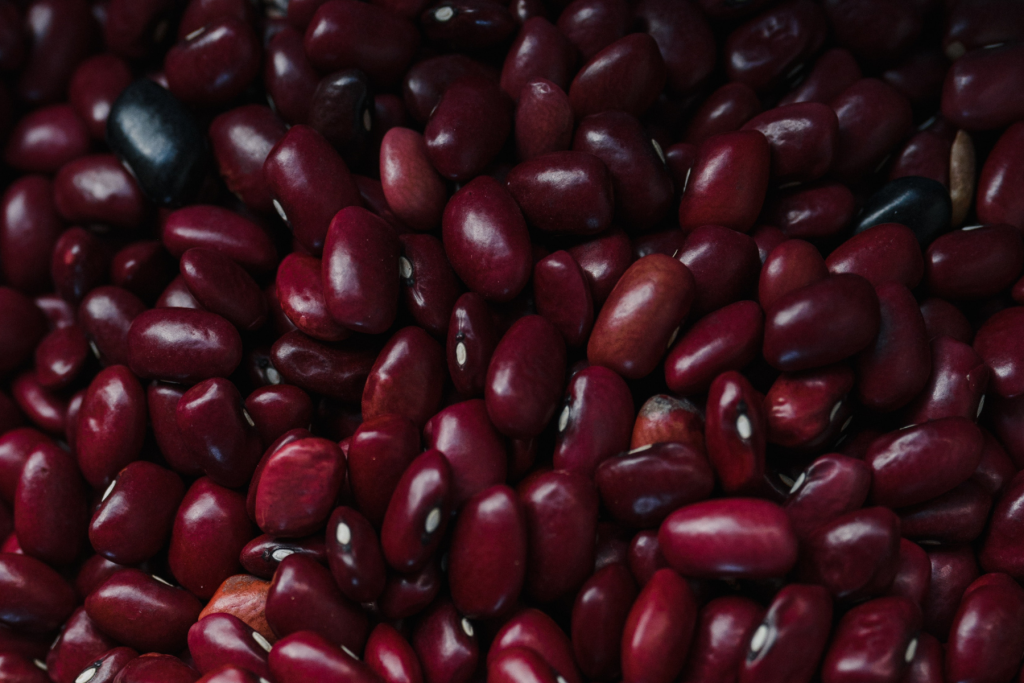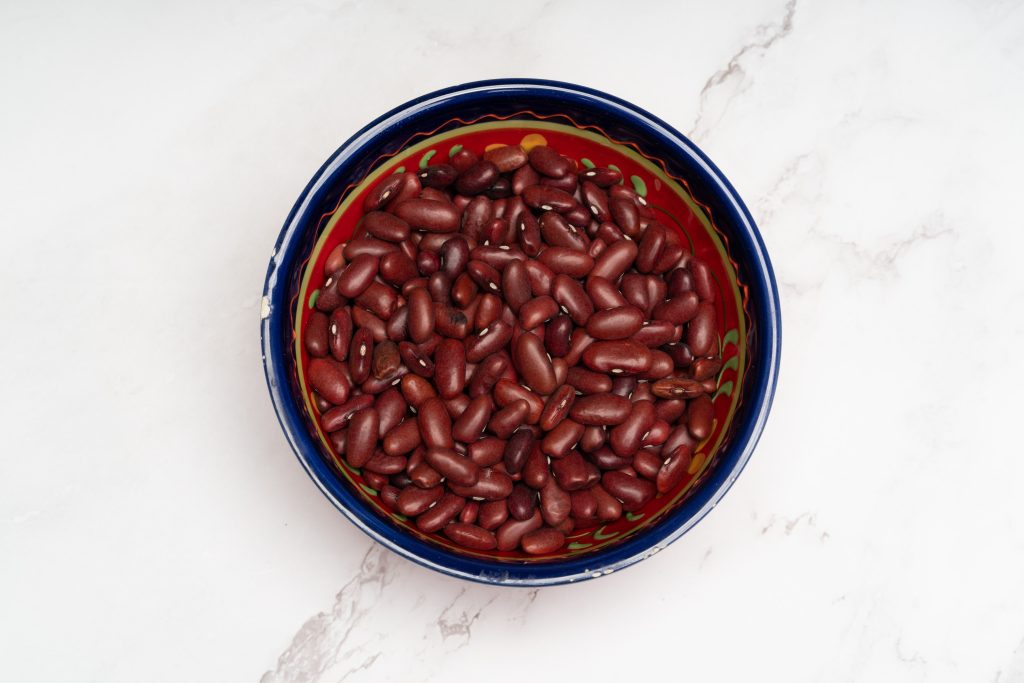Learn about the numerous benefits of incorporating kidney beans into your diet.
Discover the Benefits of Including Kidney Beans in Your Diet
Are you looking for a delicious and nutritious addition to your diet? Look no further than kidney beans! These vibrant and flavorful legumes are not only tasty but also packed with essential nutrients that can benefit your overall health. In this article, we will explore the nutritional profile of kidney beans, discuss their numerous health benefits, provide creative ideas for incorporating them into your meals, and highlight important precautions to keep in mind. So, let’s dive right in and discover why kidney beans deserve a place on your plate!
Understanding the Nutritional Profile of Kidney Beans

Before we delve into the specific benefits of kidney beans, let’s take a closer look at their impressive nutritional profile. These little powerhouses are rich in proteins, vitamins, minerals, and fiber, making them a valuable addition to any well-balanced diet.
Did you know that kidney beans are not only delicious but also highly nutritious? They are a great source of plant-based proteins, which is excellent news for vegetarians and vegans. These proteins are essential for building and repairing tissues in our bodies, ensuring that we stay strong and healthy.
But that’s not all! Kidney beans are also packed with essential amino acids. These amino acids play a crucial role in our overall well-being, supporting various bodily functions and promoting optimal health. So, the next time someone questions your protein intake, proudly respond, “Kidney beans, my friend!”
Vitamins and Minerals Found in Kidney Beans
Apart from proteins, kidney beans are also a treasure trove of essential vitamins and minerals. They contain a significant amount of folate, a B-vitamin that supports healthy cell growth and development. Folate is especially important for pregnant women, as it helps prevent certain birth defects.
But that’s not all! Kidney beans also provide us with other essential minerals like iron, magnesium, potassium, and zinc. Iron is crucial for transporting oxygen throughout our bodies, while magnesium helps maintain normal nerve and muscle function. Potassium is essential for regulating blood pressure, and zinc supports our immune system, helping us fight off infections.
By adding kidney beans to your diet, you’ll not only boost your taste buds but also your intake of these essential vitamins and minerals. So, why not enjoy a delicious kidney bean salad or a hearty kidney bean stew?
Fiber Content and Its Benefits
One of the standout features of kidney beans is their high fiber content. They are an excellent source of both soluble and insoluble fiber, which can provide numerous health benefits.
Let’s talk about soluble fiber first. This type of fiber forms a gel-like substance in our digestive system, slowing down the absorption of sugar and promoting stable blood sugar levels. It also helps lower cholesterol levels, reducing the risk of heart disease. So, by incorporating kidney beans into your meals, you’ll be taking a proactive step towards a healthier heart.
Now, let’s move on to insoluble fiber. This type of fiber adds bulk to our stool, promoting regular bowel movements and preventing constipation. It also helps maintain a healthy digestive system by providing food for the beneficial bacteria in our gut. So, if you’re looking to keep your digestive system happy and your trips to the bathroom regular, kidney beans are your go-to legumes!
In conclusion, kidney beans are not only a tasty addition to our meals but also a nutritional powerhouse. They provide us with plant-based proteins, essential amino acids, vitamins, minerals, and fiber. So, the next time you’re planning your menu, consider incorporating kidney beans into your dishes for a boost of nutrition and flavor.
Health Benefits of Kidney Beans
Now that we understand the amazing nutritional profile of kidney beans, let’s explore the many health benefits they offer. These beans are more than just a tasty addition to your meals – they can truly work wonders for your well-being.
Kidney beans, scientifically known as Phaseolus vulgaris, are a type of legume that are rich in nutrients and have been consumed for centuries. They are a staple in many cuisines around the world, and for good reason. Not only do they provide a delicious and satisfying addition to meals, but they also offer numerous health benefits that can support your overall well-being.
Role in Blood Sugar Regulation
If you’re concerned about maintaining stable blood sugar levels, kidney beans are a fantastic choice. Thanks to their high fiber and protein content, they help slow down the digestion and absorption of carbohydrates, preventing dramatic spikes in blood sugar. This makes kidney beans an ideal food for individuals with diabetes or those aiming to manage their blood sugar levels.
In addition to their impact on blood sugar, kidney beans also contain a unique type of starch called resistant starch. Resistant starch is not fully digested in the small intestine and instead reaches the large intestine, where it acts as a prebiotic. This means that it serves as food for the beneficial bacteria in your gut, promoting a healthy gut microbiome and overall digestive health.
Kidney Beans and Heart Health
When it comes to heart health, kidney beans are real superheroes. Their high fiber content helps reduce bad cholesterol levels, thus lowering the risk of heart disease. Additionally, they contain potassium, which helps regulate blood pressure and maintain a healthy cardiovascular system.
Furthermore, kidney beans are a good source of antioxidants, including flavonoids and anthocyanins. These compounds have been shown to have anti-inflammatory and anti-aging effects, protecting your heart and blood vessels from damage caused by oxidative stress.
So, show your heart some love by including kidney beans in your diet – it’ll thank you later!
Weight Management and Kidney Beans
If you’re watching your weight or aiming to shed a few pounds, kidney beans can be your secret weapon. They are low in fat and calories but high in fiber and protein, helping you feel fuller for longer. This can aid in controlling appetite and preventing unhealthy snacking throughout the day.
Additionally, the combination of fiber and protein in kidney beans can help stabilize blood sugar levels, reducing cravings for sugary and high-calorie foods. By incorporating kidney beans into your meals, you can maintain a balanced and nutritious diet that supports your weight management goals.
So, say goodbye to those pesky cravings and hello to a healthier, slimmer you with the help of kidney beans!
In conclusion, kidney beans are not only a delicious and versatile ingredient, but they also offer a wide range of health benefits. From supporting blood sugar regulation to promoting heart health and aiding in weight management, these legumes are a valuable addition to any diet. So, next time you’re planning your meals, be sure to include kidney beans and reap the many rewards they have to offer!
Incorporating Kidney Beans into Your Meals
Now that we’ve covered the incredible health benefits of kidney beans, let’s explore some delicious ways to incorporate them into your meals. From breakfast to dinner and even snacks, the possibilities are endless!
But before we dive into the recipes, let’s take a moment to appreciate the history and versatility of kidney beans. These small, kidney-shaped legumes have been a staple in cuisines around the world for centuries. Native to Central and South America, kidney beans were introduced to Europe by Spanish explorers during the 15th century. Today, they are enjoyed in a variety of dishes, from hearty stews to zesty salads.
Delicious Breakfast Ideas with Kidney Beans
Who said kidney beans are just for savory dishes? Start your day off right with a hearty breakfast that includes these versatile legumes. How about a kidney bean and avocado toast? Simply mash kidney beans with avocado, spread it on whole-grain toast, and top it with a sprinkle of lemon juice and a dash of hot sauce for an extra kick.
If you’re feeling more adventurous, try adding kidney beans to a veggie omelet. The beans add a unique texture and a boost of protein, making your breakfast more filling and satisfying. Or, for a quick and easy option, blend kidney beans into a smoothie along with your favorite fruits and a dollop of Greek yogurt. The beans will add a creamy consistency and a nutritional punch to your morning meal.
Lunch and Dinner Recipes Featuring Kidney Beans
If you’re looking for a filling and flavorful lunch or dinner option, kidney beans are your culinary best friend. Whip up a delicious vegetarian chili by combining kidney beans, diced tomatoes, onions, bell peppers, and spices like cumin and chili powder. Simmer it all together for a comforting and satisfying meal that will warm your soul.
For a lighter option, toss kidney beans into a refreshing salad with mixed greens, cherry tomatoes, cucumber, and your favorite dressing. The beans will add a creamy texture and a nutty flavor to the salad, making it a perfect choice for a summer lunch or dinner. And if you’re in the mood for something more exotic, try making kidney bean curry. The combination of spices and the creaminess of the beans will transport your taste buds to the vibrant streets of India.
Snack Ideas Using Kidney Beans
When hunger strikes between meals, don’t reach for those unhealthy processed snacks. Instead, turn to kidney beans for a nutritious and delicious snack. Roasted kidney beans make for a crunchy and protein-packed treat. Simply toss them in a bit of olive oil, season with your favorite spices like paprika, garlic powder, and cayenne pepper, and bake them until golden and crispy.
But roasted kidney beans are not the only snack option. You can also try making a batch of homemade kidney bean hummus. Blend kidney beans, garlic, lemon juice, and tahini until smooth, and enjoy it with fresh veggies or pita chips. The creamy texture and rich flavor of the hummus will make you forget about store-bought dips.
So, whether you’re a breakfast enthusiast, a lunch lover, or a snack connoisseur, kidney beans have got you covered. With their versatility and nutritional benefits, they are a fantastic addition to any meal. So go ahead, get creative in the kitchen, and let kidney beans take center stage in your culinary adventures!
Precautions and Potential Side Effects
As with any food, it’s essential to be aware of precautions and potential side effects associated with kidney beans. By taking these into consideration, you can fully enjoy the benefits while minimizing any risks.

Proper Preparation and Cooking of Kidney Beans
Raw kidney beans contain a naturally occurring toxin called lectin, which can cause digestive issues if not cooked properly. To eliminate this toxin, ensure that you soak kidney beans overnight and cook them thoroughly before consuming. This will ensure their safety and minimize any potential side effects.
Allergies and Intolerances Related to Kidney Beans
While kidney beans are generally safe for most people, some individuals may have allergies or intolerances to legumes in general. If you experience any adverse reactions such as digestive discomfort, bloating, or skin rashes after consuming kidney beans, it’s best to consult with a healthcare professional.
Kidney Beans and Digestive Health
Kidney beans are high in fiber, which can be beneficial for most individuals. However, for some people, consuming large amounts of fiber can lead to gastrointestinal discomfort or bloating. If you have a sensitive digestion or a history of digestive issues, it’s best to gradually introduce kidney beans into your diet and monitor how your body responds.
Now that you’re armed with knowledge about kidney beans, it’s time to incorporate them into your diet and discover their incredible benefits for yourself. Whether you choose to whip up a nutritious breakfast, prepare a hearty dinner, or enjoy them as a wholesome snack, kidney beans are sure to become a staple in your kitchen. So, what are you waiting for? Discover the joy of kidney beans today and embark on a journey towards a healthier and more vibrant you!







